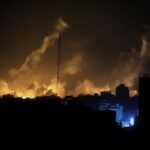DAVAO CITY (MindaNews / 04 November) – Japanese Prime Minister Kishida Fumio has vowed to support peace efforts in the Bangsamoro Autonomous Region in Muslim Mindanao (BARMM).
Speaking during a Special Joint Session at the Batasang Pambansa on Saturday, Fumio announced that the Japanese government has been supporting the Philippine government in its efforts to address the conflict in some parts of Mindanao.
He said his government pledged to provide construction equipment for disaster management in BARMM.
“Japan has supported the peace process and economic development over the past two decades. We just announced yesterday in a meeting with President Marcos the provision of heavy equipment for disaster management in Mindanao,” he said.
On Friday, the signing of the Exchange of Notes between the Philippines and Japan took place for the provision of construction equipment for disaster quick response operations in BARMM.
In a joint press statement, President Ferdinand Marcos Jr. expressed “appreciation for Japan’s continued commitments to the development of the Philippines, specifically the assistance that it has provided to the Philippines’ capacity development efforts and infrastructure development projects,” including BARMM.
The Japanese leader also reaffirmed the “strong bilateral relations between Japan and the Philippines and looked forward to further strengthening the Strategic Partnership.”
“Through the Japan-Bangsamoro Initiatives for Reconstruction and Development or J-BIRD program, Japan has contributed over 5 billion Yen (approximately 2.5 billion Pesos) since 2002 in Mindanao’s conflict-affected areas to enable its people to realize the dividends of peace. Since 2006, Japan has deployed socio-economic development experts to the International Monitoring Team (IMT),” according to a statement posted on October 1, 2019 on the website of the Embassy of Japan in the Philippines.
Aquino-Murad meetings in Japan
Japan prominently figured in the GPH-MILF peace process when, on August 4, 2011, its government agreed to host a meeting between then President Benigno S. Aquino III and MILF Chair Ebrahim Murad.
The two parties agreed on Japan as the venue, as the nearest and also most involved in the peace process among the four member-countries of the International Contact Group.
The meeting, which was kept secret from the public, including the media, raised apprehensions that it could have breached some diplomatic protocols.
As recounted by GPH peace panel member Miriam Coronel-Ferrer in an article on the Official Gazette, “Critics have derided the August 4 meeting of President Noynoy Aquino and Moro Islamic Liberation Front chair Ebrahim Murad as hasty, lacking in transparency, and ill-advised. Some even raised fears of a ‘secret deal’ and nitpicked on the diplomatic implications.”
“Sitting face-to-face in black suits on elegant chairs on a thick carpet in a foreign country does not make the meeting state-to-state. International humanitarian law applicable to domestic conflict is clear that any recognition of rights and responsibilities or legitimacy to a party does not change the legal standing of the armed group. There was thus no elevation of the MILF’s status beyond that of a domestic non-state armed group engaged in peace talks — fellow-citizens who are exploring ways and means to transform an adversarial relationship with the government into a partnership,” Ferrer, who would become GPH peace panel chair after her predecessor, Marvic Leonen, was appointed Associate Justice of the Supreme Court, said.
Aquino III and Murad met again in Japan on June 24, 2014 to talk about the delays in the crafting of the law that would create what is now called BARMM. (Antonio L. Colina IV/MindaNews, with a report from H. Marcos C. Mordeno)



